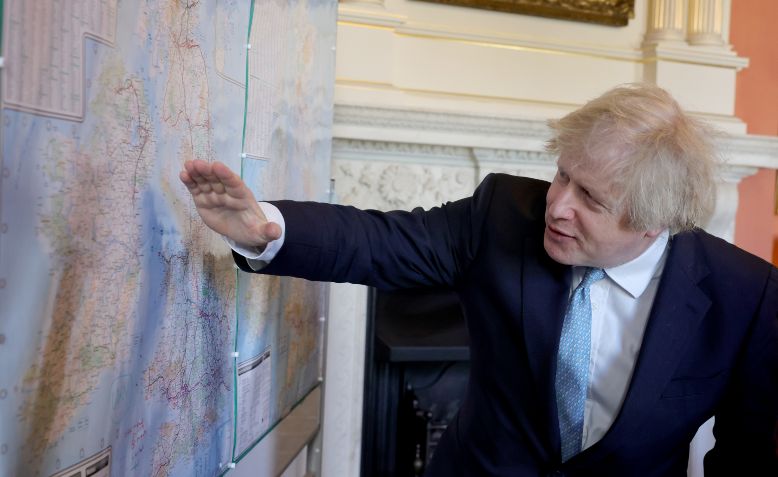 Boris Johnson in front of a map. Photo: Andrew Parsons / No 10 Downing Street / Flickr / CC BY-NC-ND 2.0, license linked at bottom of article
Boris Johnson in front of a map. Photo: Andrew Parsons / No 10 Downing Street / Flickr / CC BY-NC-ND 2.0, license linked at bottom of article
The sham Levelling Up Fund announced in the Budget is a plan to protect Tory rule rather than invest where the money’s needed, writes Terina Hine
Unsurprisingly, the media is almost entirely focused on the fallout from that royal interview. Whether this latest blow to the monarchy erupts into a full-scale constitutional crisis is yet to be seen, but while the country wrings its hands another constitutional principle is quietly being eroded.
In last week’s budget the Treasury announced £4.8bn investment for ‘redrawing the economic map of the country’. The new Levelling Up Fund (LUF) promised during the 2019 election campaign aims to provide support for deprived areas, on the face of it a commendable goal.
Upon closer scrutiny however, it appears to be a political map, rather than an economic one, that is being drawn; the government intends to spend considerable sums of public money for private party political gain.
Pork barrel politics has a long history and the Tories are no stranger to its use – look no further than the dubious deal between Theresa May and the DUP for recent precedent.
Now they are at in again: this time taxpayers’ cash is being misappropriated to reward Conservative voters and to target supposedly winnable seats. The £4.8bn, a substantial sum, (enough to give all NHS nurses a pay rise of 25%) is not being directed according to need but according to political affiliation.
The Treasury have categorised each local authority area into one of three bands – with roughly a third of local authorities in each band – the highest band (category 1) is prioritised for funding. It would therefore be reasonable to expect the poorest, most deprived areas to be in category 1. But no.
Political bias, described as ‘blatant’ by Diane Coyle, Professor of Public Policy at Cambridge University, has ensured that Tory-held seats and regions are prioritised over poorer Labour constituencies or mixed areas. According to Professor Coyle, if the Treasury ever reveals how the priority list was drawn up, it will have to ‘retrofit the methodology to justify the rankings’.
Thirty-one areas placed in the highest priority category (category 1) of the LUF are not in the top third of the most deprived places. Twenty-six of these 31 areas are entirely represented by Tory MPs, the rest have at least one Tory MP. The Chancellor’s own constituency, Richmondshire in North Yorkshire, is 251st (out of 317) in the government’s 2019 deprivation index, yet finds itself prioritised in LUF category 1.
Several of the most deprived areas in the country (Labour-voting) do not appear in category 1.
Conservative held areas in category 1 include Derbyshire Dales (ranked 265th in the deprivation index), Richmondshire (251st), East Northamptonshire (226th) and Lewes (194th).
In its defence, the Treasury has said its funding priorities are based on more than just economic deprivation, but fails to provide any methodology or assessment criteria. Health deprivation may be one factor considered, although Richmondshire ranks 256th in the health league table, so that wouldn’t help explain the inclusion of the Chancellor’s seat.
Newark – represented by government housing minister Robert Jenrick – is also in the top priority group yet ranks 148th in the deprivation index. This is not the first time that Newark or Jenrick have been embroiled in a possible corruption scandal.
In 2019 the House of Commons Public Accounts Committee set up an inquiry into the use of the £3.6bn Towns Fund (a fund designed to boost struggling towns). It concluded that the selection of towns was not impartial, that the government had failed to publish the process it followed, and that there was an over-representation of towns in Tory held seats. The Secretary of State for Housing, Robert Jenrick’s own constituency town of Newark was allocated £25m, the maximum permitted. It all sounds a little too familiar.
The government has been asked repeatedly to explain the methodology used in drawing up Levelling Up Fund priority list, and are now being threatened with legal action, but still no explanation has been forthcoming. If this multi-billion pound fund goes ahead as published, it will be difficult not to conclude that the government is using taxpayers money to directly buy votes.
Join Revolution! May Day weekender in London
The world is changing fast. From tariffs and trade wars to the continuing genocide in Gaza to Starmer’s austerity 2.0.
Revolution! on Saturday 3 – Sunday 4 May brings together leading activists and authors to discuss the key questions of the moment and chart a strategy for the left.

